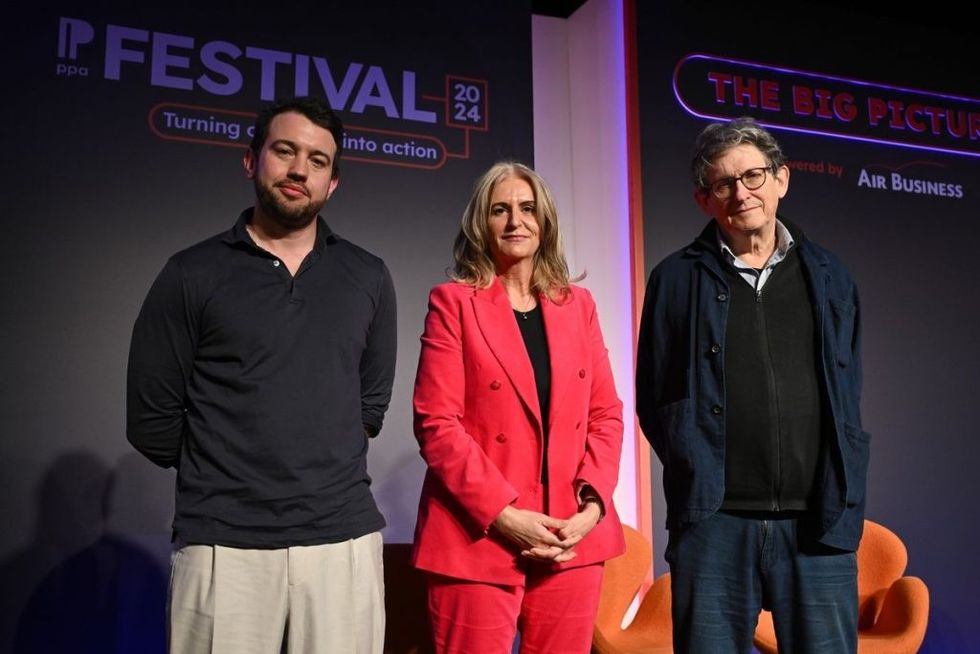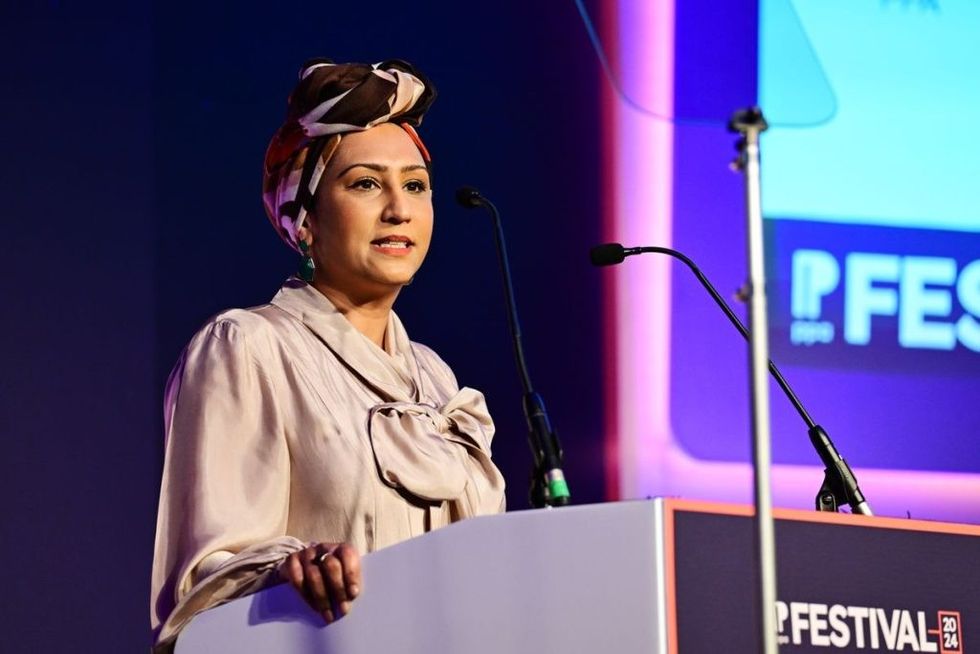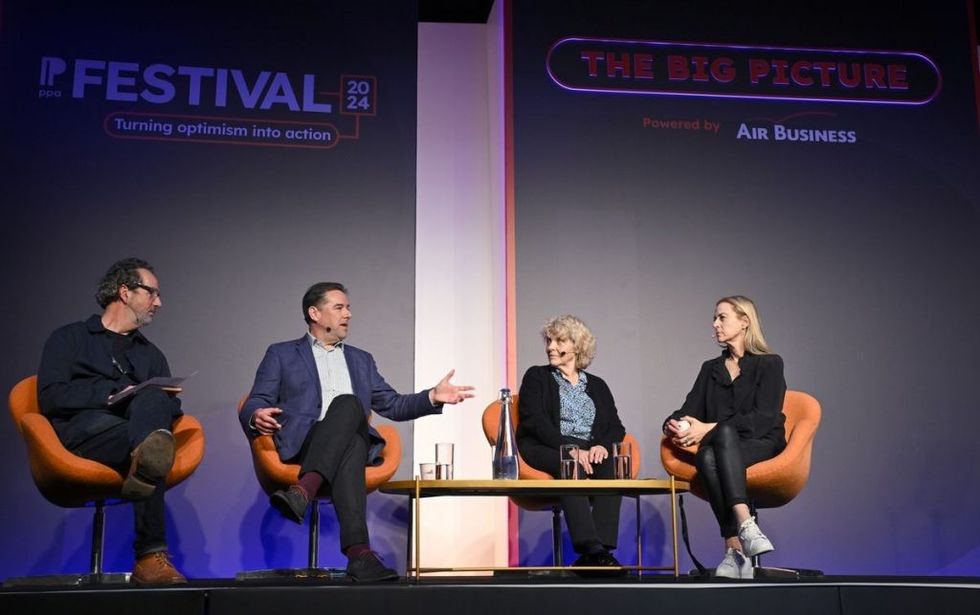By Shailesh Solanki, Kiran Paul
Highlighting the profound challenges facing journalists and citizens alike in discerning truth from falsehood, Alan Rusbridger, former editor of the Guardian, urged journalists to ‘work harder’ to define their craft.
“There's a massive crisis of trust in all kinds of institutions and people are really struggling to know who to believe and what to believe. And, if we're not the answer to that, we're in trouble,” he told the PPA Festival, organised by the industry body Professional Publishers Association (PPA) on 23 April at The Brewery in London.
Speaking at a session on the future of media, Rusbridger, who now edits the Prospect magazine, underscored the importance of media literacy education from a young age, advocating for early instruction on identifying credible sources of information.
“You always come back to media literacy, about the importance of teaching people in school, from about the age of six, to work out the signs that is going to tell you if things are true or not true - what's obviously an essential tool of being a citizen,” he said.
“And I think, as journalists, we have to work harder on trying to define what our craft is. Explain that because this is such a weak word, which encompasses many different things. We maybe assume that our readers are too sophisticated in knowing the differences between those different types of craft.”
Quality over quality
The session, moderated by Nina Wright, chair of Harmsworth Media, which publishes the i newspaper and New Scientist magazine, also heard Joshi Herrmann, founder and editor Mill Media, a pioneering brand committed to revitalising local journalism, sharing insights into his innovative approach to storytelling and audience engagement.
Herrmann, a former contributor to mainstream newspapers like the Times and the Evening Standard, expressed his motivation for founding The Mill as a local digital newspaper in Manchester. He articulated a vision for creating a publication that prioritised the kind of high-quality journalism he was passionate about, while eschewing political partisanship and the race for clicks.
Speaking to a room full of media professionals, he pinpointed a critical issue plaguing the industry: the pressure on journalists to churn out numerous stories at the expense of quality, a trend he believes has contributed to declining trust in the media.
At The Mill, they have taken a different approach. “You have to radically reduce the number of stories,” Herrmann explained. “And you have to say to readers, ‘we're going to send you much less, but we really do our best to make the quality as high as possible’. So it's a radical reduction in the volume, and increase in quality.”

Despite skepticism surrounding the viability of such an approach, Herrmann noted that readers have responded positively to The Mill's commitment to quality over quantity.
“I think people actually like that sort of stuff. What they're actually doing is they're saying ‘I'm willing to pay a subscription per month for much less stuff as long as that stuff was highly differentiated’. That's a huge change in publishing. And that's a real opportunity for the industry,” he said.
Launched in 2020 in Manchester, they have now publications in four cities – including The Tribune in Sheffield, The Post in Liverpool and The Dispatch in Birmingham – with more than 100,000 readers, including over 7,000 paying subscribers, in their mailing list.
Herrmann also addressed the evolving role of local newspapers in the digital age. He observed that the traditional newspaper ‘bundle’ – encompassing everything from sports coverage to classified ads – has eroded over time, with many functions now fulfilled by alternative sources of information. In this landscape, Herrmann argued, the value of professional journalism lies in its ability to provide in-depth, thoroughly researched reporting that goes beyond the superficial.
“In this era where everything has splintered into millions of different units, you have to work out which bit of the bundle is still valuable. And I think a bit of the bundle that is still valuable is a professional journalist spending a week or weeks, speaking to like ten different people for the story, reading the reports, getting the documents, and presenting a really well written piece,” he said.
Looking ahead, Herrmann stressed the importance of raising standards within the industry, particularly as media companies vie for the attention of younger audiences accustomed to the quality offerings of streaming platforms like Netflix.
“If we want to engage younger people, we're going to need to be better. Standards need to be higher, not lower. We're going to need to understand that we're competing with Netflix. In fact, I think there's a very good chance for a small number of quality media companies to do that,” he said, contrasting this approach with what he described as ‘machine-level’ media companies focused solely on generating clicks.
Optimism and challenges
In her opening remarks, Sajeeda Merali, PPA chief executive, emphasised the evolving landscape of publishing, highlighting both opportunities and obstacles faced by the industry.
“It's a complex landscape but one of opportunity and optimism. Digital has allowed publishers to reach wider audiences creating more engaging content, and monetise their brands in new ways to become more interactive, immersive and personalised,” she said.
“Yet, as this digitalization continues to reshape the way information is accessed and consumed, it is not without its challenges. Monetizing content sustainably, navigating search engine algorithms, cookie consent, protecting IP, regulating AI, and maximising the opportunity of first party data is demanding that publishers continuously recalibrate their strategies to retain and grow audience engagement,” she added.

PPA represents specialist media businesses in the UK, with members ranging from large multinational companies to smaller independent publishers. Reflecting on the industry body’s work last year, Merali highlighted the advocacy efforts for fair digital regulation.
“The PPA public affairs team has been at the heart of the discussion on digital regulation campaigning for a truly competitive digital economy for publishers,” she said, as she welcomed the ‘landmark’ Digital Markets, Competition and Consumers Bill, which she said would pave the way for the ‘decentralisation of profits’ from the dominant platforms.
“Platforms and their large language models use the valuable work of publishers to attract and retain audiences. And as we approach the election, we will continue to urge the government to regulate AI so that copyright infringement of this new technology can be addressed and that the sector is adequately compensated,” she said.
She also dwelled upon the initiatives to promote sustainability within the publishing sector and develop networks to address industry challenges. She encouraged industry stakeholders to engage with these initiatives and emphasised the importance of collective action in addressing pressing issues such as climate emergency and talent diversity.

Various sessions at the PPA Festival saw over 100 speakers addressing all areas of B2B and B2C publishing. Speakers included Andrea Thompson, editor-in-chief of Marie Claire UK, Carola York, managing director of FT Specialist Europe, Seema Hope, global head of consumer research at the Economist, and Katie Vanneck-Smith, chief executive of Hearst UK, among others.
The closing session, a panel discussion on the Post Office scandal and the power of storytelling, heard from Bryan Glick, editor-in-chief of Computer Weekly, which broke the first story about the scandal in 2009. Jo Hamilton, former sub-postmistress, Natasha Bondy, creative director at Little Gem Media and Tom Loxley, editorial director at Radio Times, also spoke at the session.




